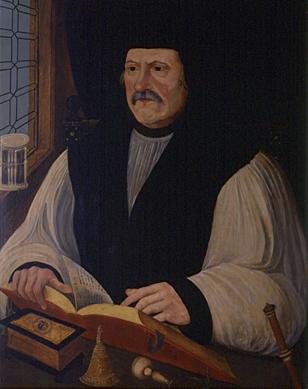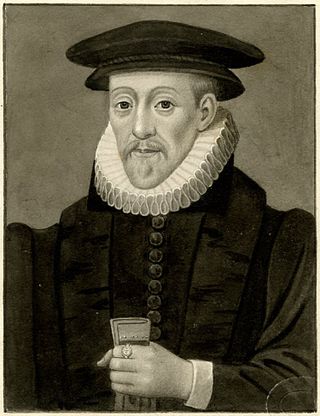Related Research Articles

Christopher Marlowe, also known as Kit Marlowe, was an English playwright, poet, and translator of the Elizabethan era. Marlowe is among the most famous of the Elizabethan playwrights. Based upon the "many imitations" of his play Tamburlaine, modern scholars consider him to have been the foremost dramatist in London in the years just before his mysterious early death. Some scholars also believe that he greatly influenced William Shakespeare, who was baptised in the same year as Marlowe and later succeeded him as the preeminent Elizabethan playwright. Marlowe was the first to achieve critical reputation for his use of blank verse, which became the standard for the era. His plays are distinguished by their overreaching protagonists. Themes found within Marlowe's literary works have been noted as humanistic with realistic emotions, which some scholars find difficult to reconcile with Marlowe's "anti-intellectualism" and his catering to the prurient tastes of his Elizabethan audiences for generous displays of extreme physical violence, cruelty, and bloodshed.

Irenaeus was a Greek bishop noted for his role in guiding and expanding Christian communities in the southern regions of present-day France and, more widely, for the development of Christian theology by combating heterodox or Gnostic interpretations of Scripture as heresy and defining proto-orthodoxy. Originating from Smyrna, he had seen and heard the preaching of Polycarp, who in turn was said to have heard John the Evangelist, and thus was the last-known living connection with the Apostles.
In Christian theology, Sabellianism is the belief that there is only one Person in the Godhead. For example, Hanson defines Sabellianism as the "refusal to acknowledge the distinct existence of the Persons" and "Eustathius was condemned for Sabellianism. His insistence that there is only one distinct reality (hypostasis) in the Godhead, and his confusion about distinguishing Father, Son and Holy Spirit laid him open to such a charge." Condemned as heresy, Sabellianism has been rejected by the majority of Christian churches.

Kett's Rebellion was a revolt in the English county of Norfolk during the reign of Edward VI, largely in response to the enclosure of land. It began at Wymondham on 8 July 1549 with a group of rebels destroying fences that had been put up by wealthy landowners. One of their targets was yeoman Robert Kett who, instead of resisting the rebels, agreed to their demands and offered to lead them. Kett and his forces, joined by recruits from Norwich and the surrounding countryside and numbering some 16,000, set up camp on Mousehold Heath to the north-east of the city on 12 July.

Matthew Parker was an English bishop. He was the Archbishop of Canterbury in the Church of England from 1559 to his death. He was also an influential theologian and arguably the co-founder of a distinctive tradition of Anglican theological thought.

The Imitation of Christ, by Thomas à Kempis, is a Christian devotional book first composed in Medieval Latin as De Imitatione Christi. The devotional text is divided into four books of detailed spiritual instructions: (i) "Helpful Counsels of the Spiritual Life", (ii) "Directives for the Interior Life", (iii) "On Interior Consolation", and (iv) "On the Blessed Sacrament". The devotional approach of The Imitation of Christ emphasises the interior life and withdrawal from the mundanities of the world, as opposed to the active imitation of Christ practised by other friars. The devotions of the books emphasize devotion to the Eucharist as the key element of spiritual life.

The Feast of Corpus Christi, also known as the Solemnity of the Most Holy Body and Blood of Christ, is a Christian liturgical solemnity celebrating the Real Presence of the Body and Blood, Soul and Divinity of Jesus in the elements of the Eucharist; it is observed by the Latin Church, in addition to certain Western Orthodox, Lutheran, and Anglican churches. Two months earlier, the institution of the Eucharist at the Last Supper is observed on Maundy Thursday in a sombre atmosphere leading to Good Friday. The liturgy on that day also commemorates Christ's washing of the disciples' feet, the institution of the priesthood, and the agony in the Garden of Gethsemane.

Henry I, Prince of Joinville, Duke of Guise, Count of Eu, sometimes called Le Balafré ('Scarface'), was the eldest son of Francis, Duke of Guise, and Anna d'Este. His maternal grandparents were Ercole II d'Este, Duke of Ferrara, and Renée of France. Through his maternal grandfather, he was a descendant of Lucrezia Borgia and Pope Alexander VI.
Edward Wightman was an English radical Anabaptist minister, executed at Lichfield on charges of heresy; he was the last person to be burned at the stake in England for such a crime.
Robert Browne was the founder of the Brownists, a common designation for early Separatists from the Church of England before 1620. In later life he was reconciled to the established church and became an Anglican priest.
Mystici Corporis Christi(The Mystical Body of Christ) is an encyclical issued by Pope Pius XII on 29 June 1943 during World War II. Its main topic is the Catholic Church as the Mystical Body of Christ.

Apostasy in Christianity is the repudiation of Christ and the central teachings of Christianity by someone who formerly was a Christian (Christ-follower). The term apostasy comes from the Greek word apostasia meaning "rebellion", "state of apostasy", "abandonment", or "defection". It has been described as "a willful falling away from, or rebellion against, Christianity. Apostasy is the rejection of Christ by one who has been a Christian. …" "Apostasy is a theological category describing those who have voluntarily and consciously abandoned their faith in the God of the covenant, who manifests himself most completely in Jesus Christ." "Apostasy is the antonym of conversion; it is deconversion."

In Christianity, the Logos is a name or title of Jesus Christ, seen as the pre-existent second person of the Trinity. In the Douay–Rheims, King James, New International, and other versions of the Bible, the first verse of the Gospel of John reads:
In the beginning was the Word, and the Word was with God, and the Word was God.

Thomas Legge was an English playwright, prominently known for his play Richardus Tertius, which is considered to be the first history play written in England.

In Christian eschatology, the Antichrist refers to people prophesied by the Bible to oppose Jesus Christ and substitute themselves as "saviors" in Christ's place before the Second Coming. The term Antichrist is found four times in the New Testament, solely in the First and Second Epistle of John. The Antichrist is announced as the one "who denies the Father and the Son."

Edmund Scambler was an English bishop from Cambridge University. He served as pastor under Queen Mary Tudor.
William Burton was an English clergyman, known for his writings, an insider's view of the Puritan ascendancy at Norwich, and as an eyewitness to heresy executions.
Thomas Braddock or Bradock was an Anglican clergyman of the 16th century, Headmaster of Reading School from 1588 to 1589 and a translator into Latin.

The putative Marlowe portrait is an unsigned portrait on wooden panel, dated 1585, which was discovered in 1952 or 1953 at Corpus Christi College, Cambridge. It has been proposed that the portrait depicts the English playwright Christopher Marlowe (1564–1593), though several scholars have suggested that this is unlikely.
References
- ↑ "Kett, Francis (KT566F)". A Cambridge Alumni Database. University of Cambridge.
- ↑ Park Honan, Christopher Marlowe, Poet and Spy, OUP, 2005, p. 79.
- Dictionary of National Biography , Oxford University Press